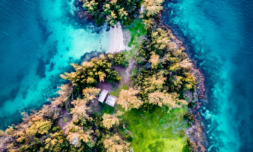A new law has been set out to protect endangered sea turtles in Panama. The hope is that neighbouring countries will follow suit in granting them a right to a healthy environment that is free from poaching activity.
Panama has just taken ‘I like turtles’ to a whole new level.
The country has set out new laws to give its abundant sea turtle population the right to live and have free passage within a healthy environment.
Under the new legislation, all citizens in Panama are now allowed to ‘be the voice of sea turtles and defend them legally.’ This means governments, corporations, and citizens can be held legally accountable for violating the rights of sea turtles.
This is a huge win, as the South American nation is one of the world’s most vital nesting spots for leatherback and hawksbill turtles. Every year, as many as 3,000 hawksbill nests can be found on a single local beach.
Those working for organisations that protect sea turtles have high hopes that other countries will enforce a version of this new law to protect endangered sea turtles and other animals under threat.




















